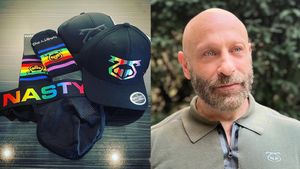Last night's premiere of Season 3 of Inside Amy Schumer was more or less a slam dunk. Sketches such as "Milk Milk Lemonade," "Football Town Nights," and "Last Fuckable Day" were hilarious and incisive. If this is a harbinger of what's to come, then this season of Inside Amy Schumer will be unmissable.
During the interview portion of the show, however, the comedian interviewed Bailey Jay, a trans woman and adult film actress, about trans issues. In classic Schumer fashion, the interview was raunchy, irreverent, and somehow charming.
Schumer has Jay run down the answers to questions she's sick of answering--which is a little more than slightly ironic as an idea--and then asks Jay about her childhood, love life, and bottom surgery.
All-in-all, it was a good segment that fit in well with the tone and tenor of the show. Jay, who co-hosted Vice's The Jim Norton Showwith Schumer's long-time friend Jim Norton was affable and funny. But, this being a polarizing topic, not everyone had a positive (or even neutral) opinion of the piece.
"Schumer facilitated one of the most clumsy, contextually clueless, cringe-inducing exchanges on transgender issues I've ever witnessed--and this, after a period of trans emergence in the media during which someone of Schumer's intelligence and curiosity should have learned to do better," Slate Associate Editor J. Bryan Lowder wrote today.
Lowder was displeased not only with the questions Schumer asked, but also that Jay's career as an adult model and porn actress wasn't mentioned.
"Before I jump into why it was such a blunt-force mess, I have to acknowledge that Bailey Jay, the self-identified transsexual who Schumer interviewed, seemed more or less fine with the often wildly invasive lines of questioning that the host pursued," Lowder states in his essay. "I am definitely not here to tell Jay how to present herself or how to feel regarding the intense focus on the fact that, as Schumer puts it at the beginning of the segment, 'You have a cock.' "
Then he quickly throws it all in reverse:
"The thing is, Inside Amy Schumer is a hugely popular show (and ostensibly a progressively minded one at that) and it does not take place in a vacuum. Jay may be totally comfortable with prurient queries about her genitals and sex life, but that's exactly the kind of scrutiny that the majority of trans women are fighting against."
Lowder does bring up some valid points: Schumer did ask some invasive questions and stating Jay's career may have added some context (or just become fodder for critics to accuse Schumer of proliferating the "tranny hooker" stereotype).
But Lowder reveals his true feelings and agenda when he writes: "From that initial misstep, the segment stumbles down all the roads prominent trans voices like Laverne Cox and Janet Mock have patiently and not-so-patiently asked cisgender folks to avoid when discussing trans lives."
Cox and Mock are media darlings because they are superbly articulate trans activists and representatives of their communities. They debate on CNN and Cox has been featured on the cover of Time and in People's "World's Most Beautiful Women" issue. Well-coiffed and well-spoken, they are the beautiful faces of beautiful black women that Middle America can more easily accept. Bailey Jay does porn and hangs out with Jim Norton.
By subtly implying that by fielding Schumer's questions and not identifying herself as a sex-worker Jay has done a disservice to her community, we are also meant to infer that Cox, Mock -- and the other serious and steadfastly camera-ready -- are the only trans people fit for primetime.
Noting that the show "does not take place in a vacuum" demonstrates that Lowder is preoccupied with the perceptions and opinions of people outside the LGBTQ community. He'd prefer to deny someone a platform to open up and discuss the issues they face than let someone who does not toe the party line to appear on television telling her story.
For the longest time, trans people on TV were reduced to jokes, oddities, and the cop-drama hooker (just ask drag performer Willam Belli who made a career of playing just that type). Now the community is being represented by eloquent, intelligent women of color. While this is certainly a marker of progress, silencing any voice because it could harm potential political gains or cause the community to lose the hearts and minds of cisgender and heterosexual Americans is a travesty in and of itself. The LGBTQ community is represented by a tapestry of voices, not just the ones that produce good soundbites.








































































